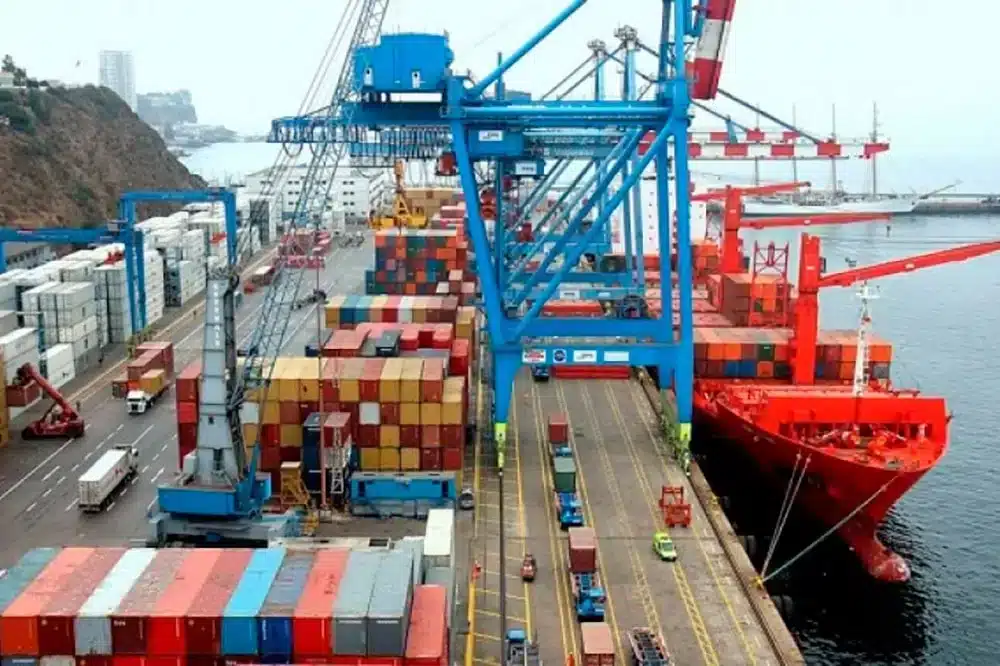
Dock at La Guaira Port near Caracas, the most important port in Venezuela. Photo: Unión Radio.

Orinoco Tribune – News and opinion pieces about Venezuela and beyond
From Venezuela and made by Venezuelan Chavistas

Dock at La Guaira Port near Caracas, the most important port in Venezuela. Photo: Unión Radio.
Caracas, July 7, 2023 (OrinocoTribune.com)—Venezuelan Vice President Delcy Rodríguez discarded rumors about the suspension of “door-to-door” imports and stated that the system is operating normally, during a meeting of the Productive Economy Council, with broad participation of representatives of the private sector.
At a meeting held on Thursday, July 6, Vice President Rodríguez stated that the flow of imports into Venezuela is going smoothly, and denied that the government has taken any measures to restrict these “door-to-door” shipment operations carried out by courier companies.
Rodríguez said that she had no idea where Bloomberg got the news that it published recently, despite the fact that there was publicly available information about meetings of Venezuelan government officials with representatives of courier companies to evaluate the status of the sector and to tackle the illegal practices of large grocery store chains and imported goods stores that take advantage of the import duty exceptions provided by the Venezuelan government since 2018 to address food shortage issues.
#ReporteVTV🗣️| Vicepresidenta Ejecutiva @delcyrodriguezv lidera reunión con el Consejo Nacional de Economía Productiva, con el fin de incrementar el financiamiento a los sectores productivos de la nación.
Reportó: Meisberd Bolívar#IndependenciaDeLaPatria pic.twitter.com/QnpnoALQiE
— VTV CANAL 8 (@VTVcanal8) July 6, 2023
By mid-June, courier companies offering door-to-door services, used by many in Venezuela for access to imported goods at more advantageous prices that may otherwise be difficult to find in Venezuela, informed customers that they were having talks with government representatives and that it might affect some delivery schedules. However, very few schedule disruptions were reported since then.
Use and abuse of courier services
A duty and tax exemption measure adopted by the Venezuelan authorities to overcome food shortages and price hikes is used by many Venezuelans – with or without access to US bank accounts. Citizens can buy food, medicines, beverages, and machine spare parts that are difficult to find in the country or that cost too much, thus securing provisions not only for consumption but also for production.
In 2018, Venezuelan President Nicolás Maduro announced economic reforms that provided some exemptions to price controls, currency exchange controls, and many other issues in the economy inherited from the Hugo Chávez administration. In 2019, after the electricity blackouts that affected Venezuela during the peak of the US-led failed “regime change” operation with former deputy Juan Guaidó, many specialized stores with imported items, known as bodegones that are found all over Venezuela, took advantage of the tax exemptions that were initially designed for individual consumers.
Venezuela Denounces 83.7% Drop in Food Imports Due to Sanctions Before FAO
Tax voracity or inefficient local businesses asking for protection
In mainstream news coverage on this issue, the common explanation circulating is tax collection. This may be one of the reasons. For months business associations have been complaining about what they call unfair competition from bodegones that do not pay import duties, while many formal stores and production enterprises have to import goods without that tax advantage.
Venezuelan productive enterprises were accustomed for decades—long before Hugo Chávez—to protections from import duties, causing them to be highly inefficient and noncompetitive. The recent campaign seems to be coming from the same sectors which are attempting to revive protectionism rather than looking to improve productivity and efficiency.
Duty-free decree extended
On June 30, the decree exonerating 90% of the customs duties and 90% of the value added tax for imported products, included in the 1,567 listed tariff codes, expired. Although there was a reduction in the number of codes and exemptions, it was a continuation of a measure implemented four years ago on imported goods.
On July 1, a new decree, numbered 6,750, was published in the Official Gazette that extended the tax and duty exoneration decree until December 31.
Changes coming
Many customers and workers in courier enterprises, as well as business owners, are expecting changes in the coming months to resolve abuses of the duty exoneration to balance benefits for ordinary citizens with duty protection for local industry.
The reality is complex, especially in a country so hard hit by US and European sanctions that have impacted all aspects of the economy. Many analysts recognize the capacity of the Maduro administration to address the crisis, taking into consideration the needs of the majority of the population as well as the opinion of the hard hit business sector.
Orinoco Tribune Special by staff
OT/JRE/SC/BLA